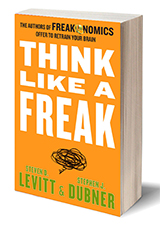My notes on Freakonomics by Steven D. Levitt and Stephen J. Dubner.
Lots of interesting stories in this book, but I’m just going to talk about 2 that really struck a chord with me.
The Cost To Avoid Guilt? Just $3
Economists in an Israeli study in day care centres started imposing a fine of $3 if any parent was more than ten minutes late picking up their kids.
The number of late pick-ups doubled.
The incentive had plainly backfired.
You have probably already guessed that the $3 fine was simply too small. For that price, a parent with one child could afford to be late every day and only pay an extra $60 each month – just one-sixth of the base fee. As babysitting goes, that’s pretty cheap. What if the fine had been set at $100 instead of $3? That would have likely put an end to the late pick-ups, though it would have also engendered plenty of ill will. (Any incentive is inherently a trade-off; the trick is to balance the extremes.)
But there was another problem with e day -care centre fine. IT substituted an economic incentive (the $3 penalty) for a moral incentive (the guild that parents were supposed to feel when they came late). For just a few dollars each day, parents could buy off their guilt. Furthermore, the small size of the fine sent a signal to the parents that late pick-ups weren’t such a big problem. If the day-care centre suffers only $3 worth of pain for each late pickup, why bother to cut short your tennis game? Indeed, when the economists eliminated the $3 fine in the 17th week of their study, the number of late-arriving parents didn’t change. Now they could arrive late, pay no fine, and feel no guilt.
Where Have All The Criminals Gone?
A crime wave in the United States in the 70’s indicated that the 80’s and 90’s were going to be a very bad decades.
They weren’t.
In fact, crime dropped across the board.
Why?
Authorities offered many reasons to explain the crime drop:
- Innovative policing strategies
- Increased reliance on prisons
- Changes in crack and other drug markets
- Aging of the population
- Tougher gun-control laws
- Strong economy
- Increased number of police
- Other
None of these reasons was the cause.
Levitt’s research revealed a strong link between the legalisation of abortion in the United States in 1973 and the sharp decline in violent crime that the nation experienced in the mid-1990s.
Wow.
The criminals of the 80’s and 90’s just weren’t being born in the 70’s.
Women in high risk situations (poverty, drugs, crime) were able to choose not to have children born into these environments.
What I Got Out Of Freakonomics
Over time I have got better at spotting bullshit, but I’ve got lots more to learn.
I like the idea that even the authorities can get it wrong sometime and that all it takes is for one person to call “bullshit” and interpret the data in a different way to find the true story.

Freakonomics, great at explaining the behavioral that is economics, but that gets lost in the general “economy economics”.
Well worth the reading, Sheldon, I agree.
Thanks Brian!